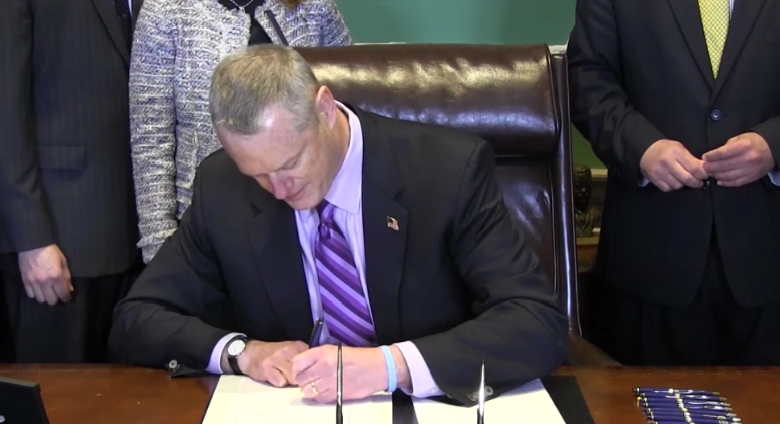Baker signs ‘bathroom bill’ into law
By State House News Service | July 8, 2016, 15:25 EDT
 Massachusetts Gov. Charlie Baker signs the solar power net metering bill at a ceremony Monday in the State House. (Image by Antonio Caban/State House News Service)
Massachusetts Gov. Charlie Baker signs the solar power net metering bill at a ceremony Monday in the State House. (Image by Antonio Caban/State House News Service) Gov. Charlie Baker on Friday afternoon signed into law legislation to guarantee access to public facilities, including sex-segregated bathrooms and locker rooms based on their self-selected gender identity.
“No one should be discriminated against in Massachusetts because of their gender identity,” Baker said in a statement announcing he’d signed the bill. “This compromise legislation extends additional protections to the Commonwealth’s transgender community, and includes language to address the public safety concerns expressed by some by requiring the Attorney General to issue regulations to protect against people abusing the law.”
A compromise bill (S 2407) was approved by both branches of the Legislature on Thursday, passing the House on a 117-36 vote and clearing the Senate on a voice vote. It bans discrimination based on gender identity in places of public accommodations and would allow transgender people to use sex-segregated facilities, like locker rooms and bathrooms, that correspond to their gender identity and not necessarily anatomical sex.
The bill directs the Massachusetts Commission Against Discrimination to adopt policies on enforcing the law and also requires the Attorney General’s office to provide guidance on how to handle legal action if any person were to assert gender identity for an improper purpose. Both offices have until Sept. 1 to report their recommendations, with the law taking full effect on Oct. 1.
After refusing to say whether he would sign or veto the bill that sparked vigorous debate, Baker in June said he would sign the House version of the bill, which contained the language relating to the attorney general and MCAD.
The Massachusetts Family Institute, which vocally opposed the bill, issued a statement Friday saying its members were “extremely disappointed that Governor Baker has broken his original campaign promise to veto this bill.”
— Written by Katie Lannan
Copyright State House News Service











